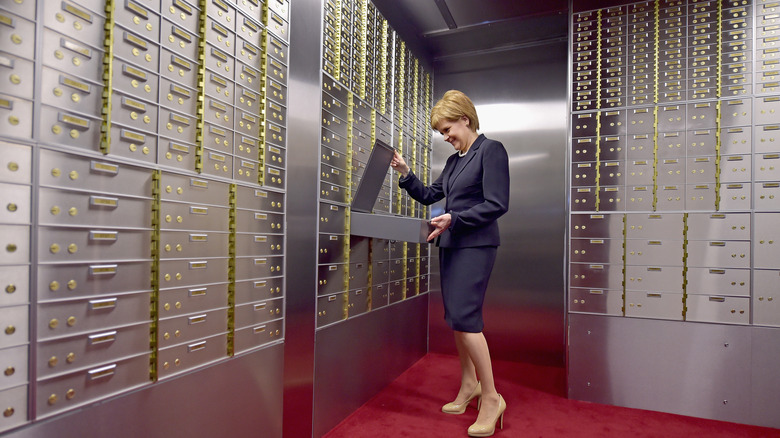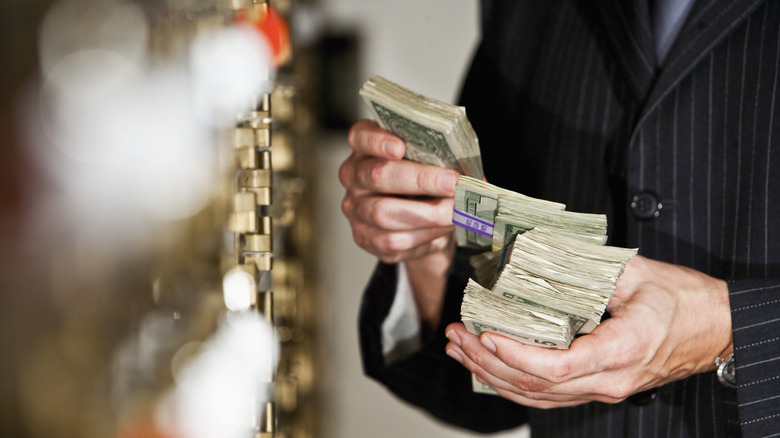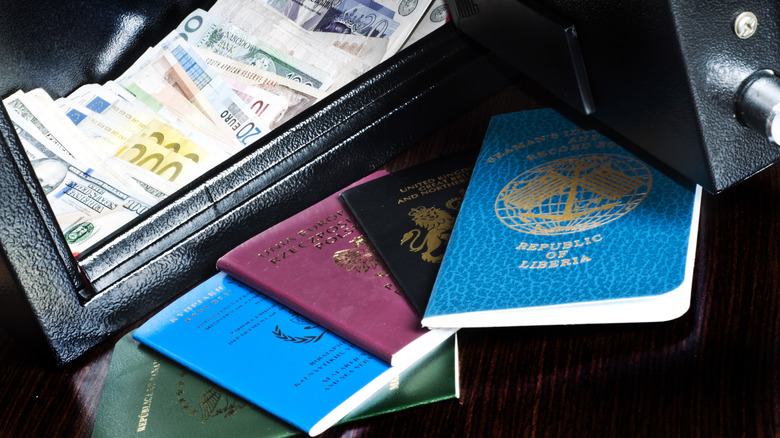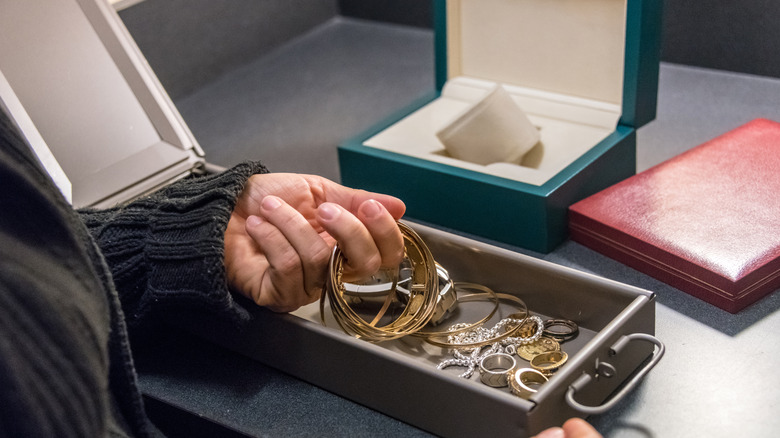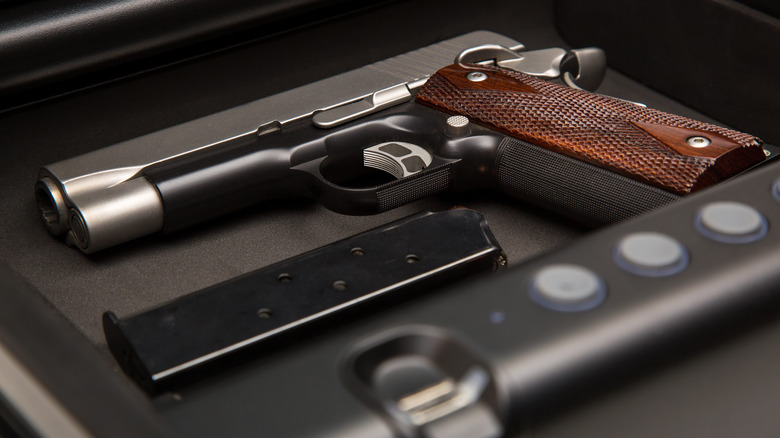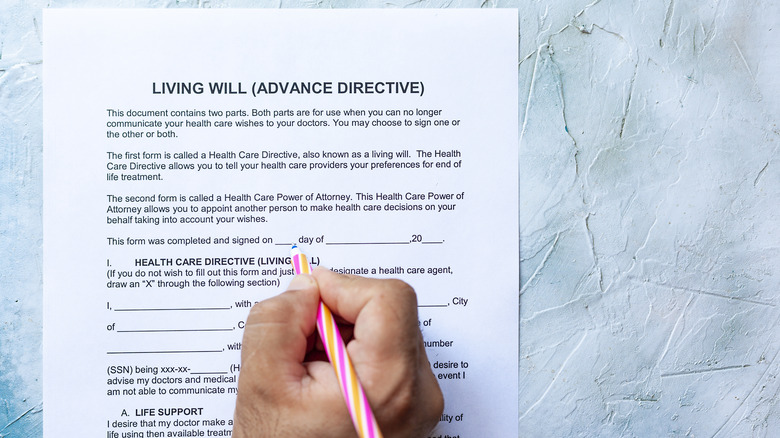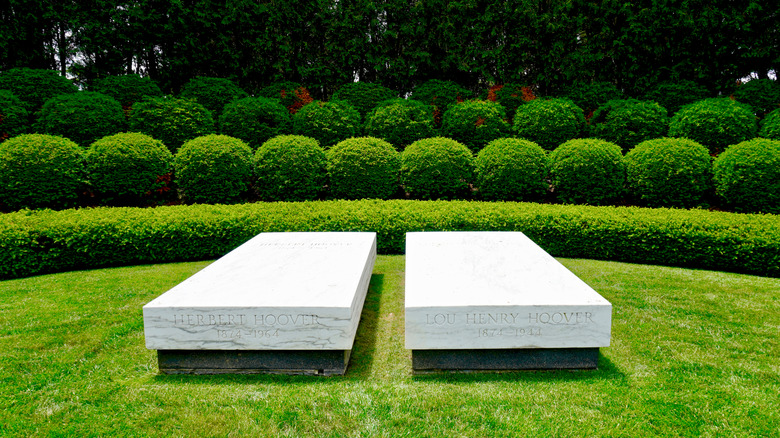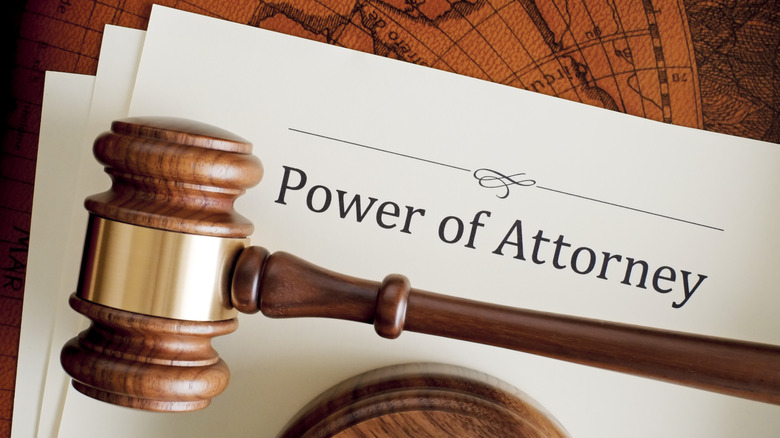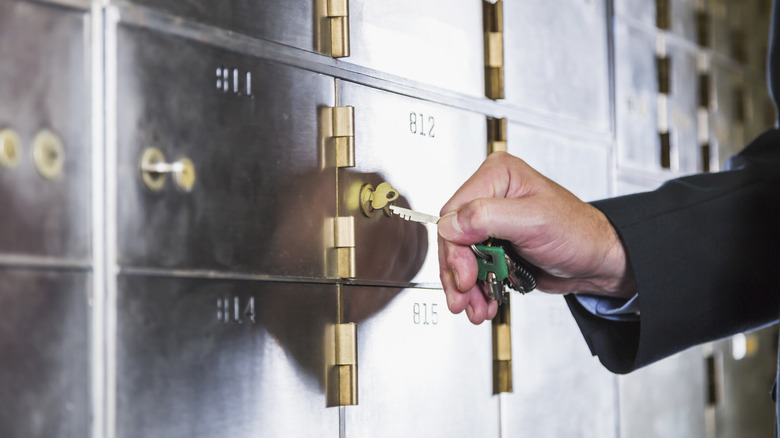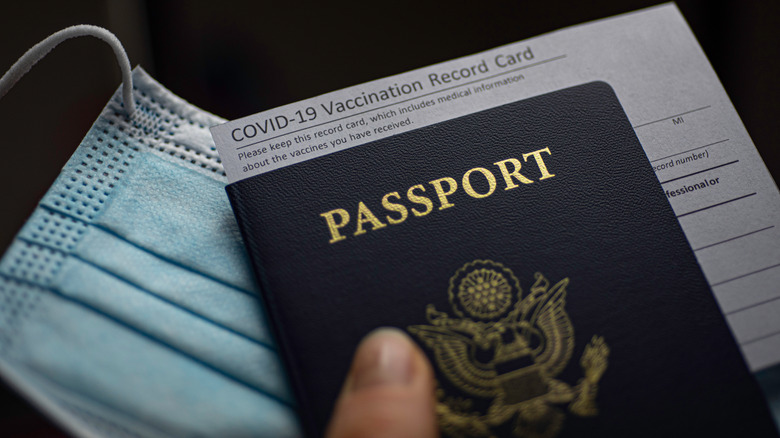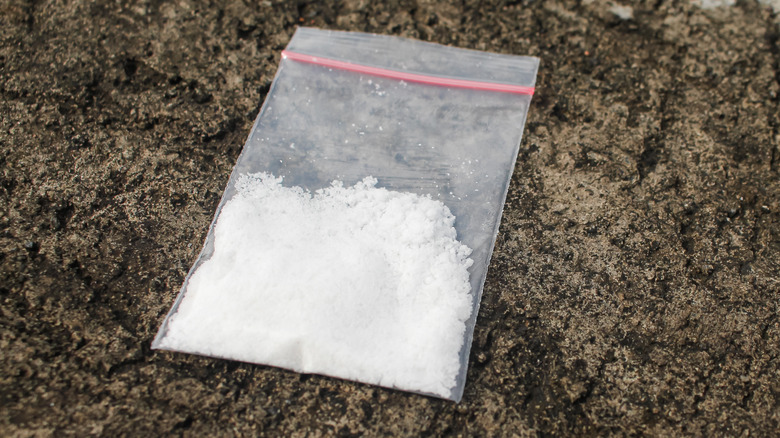Whatever You Do, Don't Put These 11 Things In A Safe Deposit Box
A safe deposit box can be a very good idea for the storage of items that will be important to you in the future. Usually not much more than 10 inches high and 15 inches wide, these storage devices often require dual key access during bank hours, with a key in possession by both you and your bank. According to the Federal Deposit Insurance Corporation (FDIC), some approved items to store in a safe deposit box are birth certificates, U.S. Savings Bonds not part of an electronic securities portfolio, and moving or still images of your insured material items. The benefit of keeping these items in a bank versus your home is the additional layers of protection — security guards, state-of-the-art surveillance systems, and several inches of bank vault between the public and your stuff — making them more secure.
Electronic and cloud storage is having an impact on how many banks are continuing to offer them as an option. Although the American Banking Association lists safe deposit boxes with dual authentication for access as a relic of the past, with new bank branches being constructed without them, the boxes themselves will remain a feature in the banks that continue to offer them — just with more responsibility offloaded to the customer through single key and bio-authentication access. While safe deposit boxes can provide you with a measure of protection, they may not be the best place to store everything. Here are 11 things that should never go into your safe deposit box.
Wills and trusts
The difference between a will and a trust is that a will dispenses your assets after you die according to your wishes, and a trust has to be set up with assets already in place before your passing. In the Los Angeles Times, a reader wrote the "Dear Liz" section about where to keep estate planning documents. The reader was advised not to put originals into a safe deposit box but instead place them in a home safe or leave them at their lawyer's office. The reason is that your death triggers a sealing of your box by the bank that can only be accessed by the executor of your estate through a court order. While there are different rules in each state around gaining access to your box after your death, your executor may need to show the state a copy of your death certificate and your will, the latter of which will be difficult to do if it's locked inside your safe deposit box.
Use digital storage like Trustworthy, which allows for the uploading of important documents, like your will or trusts, to be updated as needed and shared with loved ones or your executor should you not be around to open a safety deposit box. You'll make life easier for those left behind by storing that info on an encrypted cloud platform, which does not require navigating several layers of bank policy and state bureaucracy to access in the case of your untimely demise.
Cash
If having too much money in a savings account because the Federal Deposit Insurance Corp. (FDIC) will only insure $250,000 of it concerns you, a safe deposit box is a poor solution. The FDIC doesn't insure cash placed in a safe deposit box since they view it as separate from your savings account, which puts the onus on covering your lost items squarely on you.
Consider the case of poker champion Mike Gorodinsky. After winning $422,747 in a tournament, Gorodinsky placed his winnings in a safe deposit box at the Bellagio casino. On Twitter, Gorodinsky said, "Went to Bellagio today to access my box and my key was stuck/not opening it. They wind up having to drill it and when they lift the box out, it's empty." The rest of the tweet drops an expletive about the situation with a request for advice on how to deal with it. As far as the Bellagio is concerned, Gorodinsky was the only person with access to his winnings, so there's no restitution coming, and they aren't legally required to provide any.
Practically speaking, you earn no interest on money sitting in a box anyway. A better idea would be to research high-yield savings accounts at other banks, several of which offer 4-5% annual returns, have no monthly maintenance fees, and require no minimum balance to open. Also, your cash is still insured by the FDIC.
Passports
Passports should be the most obvious on the list of things not to place in a safe deposit box, yet people do it all the time. Although the deposit boxes used weren't in a bank, a situation recounted by WMUR9abc effectively demonstrates the problem with using them to store passports. Over 41 students from the UK on a ski trip in New Hampshire had their passports stored in their hotel's safe deposit boxes but found themselves stranded in the U.S. after the passports were mysteriously destroyed. Although they eventually sorted out the situation, a lot of stress could have been avoided had they kept their passports.
Something else to consider is the length of time it takes to gain access to your passport should you need it in a hurry since your schedule becomes bankers' hours. If you've gone through the process to obtain or replace your passport, you understand the ordeal of doing so. As per the U.S. Department of State, the routine wait time for a new passport averages 10 weeks or more, and even if you pay to expedite your passport, you'll still wait at least five weeks for it. Although there are options for faster service in the case of life-and-death emergencies, there's a whole bureaucratic process behind that. Leave your passport in a safe place at home so you can access it on your schedule without worrying about replacing it.
Uninsured valuables
According to the Robb Report, a Filipino couple living overseas stored valuables, including jewelry and coins, in seven safe deposit boxes in New York owned by JP Morgan Chase. The couple missed their annual rental payment on four of those boxes, and although the bank tried to send them a 60-day notice of the upcoming closure of those accounts, the notices were mailed to the wrong P.O. box, and the couple missed them. As a result, JP Morgan Chase went ahead and drilled open four of their safe deposit boxes, potentially liquidating $10 million worth of valuables.
As previously mentioned, banks aren't responsible for insuring anything you store in a deposit box. For example, Wells Fargo's lease agreement states in big, bold lettering, "No Insurance on Contents: The contents of your Box are not insured by Wells Fargo or the Federal Deposit Insurance Corporation." Further down in the same bold lettering, it also states, "It is our expectation that you will not place items of significant value in the Box" and "You agree you will not place items with an aggregate value in excess of $10,000 in the Box at any time" with an agreement on your part to indemnify them from legal responsibility if you do. A better idea is to store those things in a safe at home and add those items to your homeowner's insurance.
Firearms
There should be no debate that keeping firearms in a safe deposit box is not very smart. In The Firing Line group chat, a member asks if they can store a gun in a bank's safe deposit box. One member goes into great detail to explain the best way to do it, which includes silicon cleaning cloths, WD40, and a zip-up gun rug. This is frankly horrible advice. If you need to go through all this obfuscation at a bank, this is the first indication that what you're doing is questionable.
Storing a firearm in self-storage is highly illegal — except with a company like Gunsitters, which specializes in safe gun storage but only has three locations across the U.S. — so you may consider a safe deposit box to be a solution. However, most banks make strong provisions against storing guns in their safe deposit boxes in their lease agreements. The best place for firearms is a locked gun safe with ammunition locked in a separate location if you have children in the home, local law enforcement, or shooting ranges. In 2022, The U.S. Department of Justice made it necessary for licensed gun merchandisers to certify they have appropriate storage for guns on site, as well as having to make offsite gun storage systems available for sale to their customers.
Advanced health care directives
Advanced healthcare directives consist of living wills and healthcare proxies, the former of which provides instructions for your terminal care and the latter of which gives power of attorney to someone to make health decisions on your behalf when you no longer have the capacity to do so. These documents are important for end-of-life decision-making related to organ donor wishes, whether you want to be resuscitated or not if you end up on life support, or how you want to be cared for if something like Alzheimer's or dementia limited your ability to make those arrangements yourself. The person to whom you assign this responsibility is called your healthcare proxy. If they aren't aware of your wishes before something happens to you, and those wishes are buried in your safe deposit box, neither your healthcare provider nor your proxy will know what those wishes are.
According to CaringInfo, wherever you place the original copies of your directives, they should be easily and rapidly accessible when needed, preferably somewhere safe from natural disasters or fire. Utilize medical cloud platforms like MyDirectives, the U.S. Advance Care Plan Registry, or CaringInfo should your directives be in digital or video format. Of course, your proxy, close family, and your healthcare provider should have copies of your directives too. In some cases, your local hospital may also be willing to keep a file with directives on hand should you require them.
Burial instructions and deeds
Though not the happiest of matters, it's a fact of life that we're all going to die. Being responsible means preparing for that event in a way that removes some of the burden from the loved ones left behind. Most U.S. states allow for a prepayment option that settles matters like where and how you choose to be buried while covering the cost of those things so your family doesn't have to. Your burial deed should be part of your funeral planning since it allows you the right to a burial plot that you have hopefully purchased the land for as part of your prepayment. While the deed reserves you a spot, it doesn't secure the land it's in, which will average between $200 to $25,000 based on size and location. No deed, no headstone. So, your loved ones must have access to these documents as copies.
In the state of Texas, for example, a bank could allow specific family members or your executor to gain access to your safe deposit box to obtain these important documents. However, they are just as likely to require a court order, which will be pricey and an unnecessary slog. Ensure your executor and chosen family members have copies of your documents to avoid the extra hassle your friends and family don't need while they're grieving.
Power of attorney documents
In MarketWatch, the author Beth Pinkser relates how she had the presence of mind to gain access to her mother's safe deposit box while her mother was in the hospital using her power of attorney documents. This helped her avoid legal fees and wait times that would have occurred after her mother's death. Although there was a bit of a search for keys in her mother's condo storage locker, luckily, they were found with some work. Without this power of attorney and access to the coinciding documents before attempting to access her mother's safety deposit box, she would have ended up in a long probate court case that can only be handled with a will.
According to the American Bar Association, the probate court is loosely defined as a legal process to determine who gets to execute the details of your estate planning, including inheritance money and property. You don't want a court deciding that for you. What you should take away from this scenario is that keeping your power of attorney documents in your safety deposit box could put everybody in a bind after your death. Once you're deceased, you can't open the box, and if all the documentation your executor needs to access the box is inside, that won't be very helpful.
Spare keys
Whether it's your car keys or keys to your home, something you always have to keep in mind with a safe deposit box is that you can only get to it when your bank is open. If you lose the keys to your car or home, you'd better hope you notice during bank hours, or you'll be waiting for the next available day to get those spares. If you lose them on a weekend, you'll be locked outside your home until Monday morning.
It should go without saying, but keeping your spare safe deposit box key in your safe deposit box is also a losing proposition. You can't get into the box to get the spare if you need the spare to get into the box. Although the bank will have its copy, a dual-key system means two keys are needed for them to unlock your box. According to Trustworthy, retrace your steps to search for your lost keys, and if you still can't find them, inform your bank immediately. Peruse your lease agreement for what to do if you've lost your keys, and see about getting your safe deposit box contents insured. Replacing the key can set you back anywhere from $50 to $100, while the cost of the bank drilling into your safe deposit box can be $150 to $200. Invest in a good key safe like the Burton Keyguard XL Outdoor Key Safe, which is weatherproof and tough as steel.
COVID-19 vaccination cards
The Centers for Disease Control and Prevention (CDC) stopped issuing COVID-19 vaccination cards this year and have no plans to keep any records of U.S. citizen's vaccinations. Although no paper records will be kept by the CDC, you can still get a digital copy of your vaccination records through your local state health department. That said, don't go dumping your vaccination card in your safe deposit box for a memento just yet.
Allianz Travel points out that although the United States has lifted vaccination requirements for incoming and domestic flights, there are a few countries, like The Philippines, Cameroon, and Bolivia, that still require proof of vaccination or proof of a recent negative test to gain entry. While a digital vaccination record is great to have, if your phone or tablet dies midflight, you may have an issue once you get to your destination without a paper copy.
While flying in the U.S. no longer requires proof of vaccination, cruise lines like Carnival have individual policies around vaccination and negative testing, with unvaccinated travelers in some circumstances needing to apply for a vaccine exemption. COVID-19 still exists, and if travel was restricted before, it's entirely possible travel restrictions could come back again. Keep your vaccination card at home so you can grab it when you travel. Better safe than sorry.
Contraband and Illegal substances
The DEA shut down U.S. Private Vaults, a private safe deposit box company operating out of a strip mall in Beverley Hills. The DEA asserted that the company attracted drug dealers, gun dealers, and money launderers through its odd policy of anonymous, ID-free safe deposit boxes and advertisements claiming, "We don't even want to know your name." It turns out the DEA was interested in knowing names, so it confiscated the contents of the safe deposit boxes, which caused at least one owner to take the DEA to court over a breach of privacy.
The joint operation involving the DEA, FBI, and U.S. Postal Inspection Service (USPIS) secured a warrant to conduct a five-day search of the boxes after an undercover informant sold an employee 1,000 vape pens packed with marijuana for $8,000. The seizure garnered guns, drugs, and over $1 million in cash. While the government is allowing some of the owners of the deposit boxes to reclaim their items, it comes under the condition they provide law enforcement with their names.
A more legitimate institution, The Bank of America, is pretty clear on where it stands on the use of its safe deposit boxes to store illegal contents. Under "Prohibited Uses," the bank is quick to point out the restriction of access, confiscation of property, and alerting law enforcement as its official policy. Stay out of prison by keeping illegal things out of your box.
